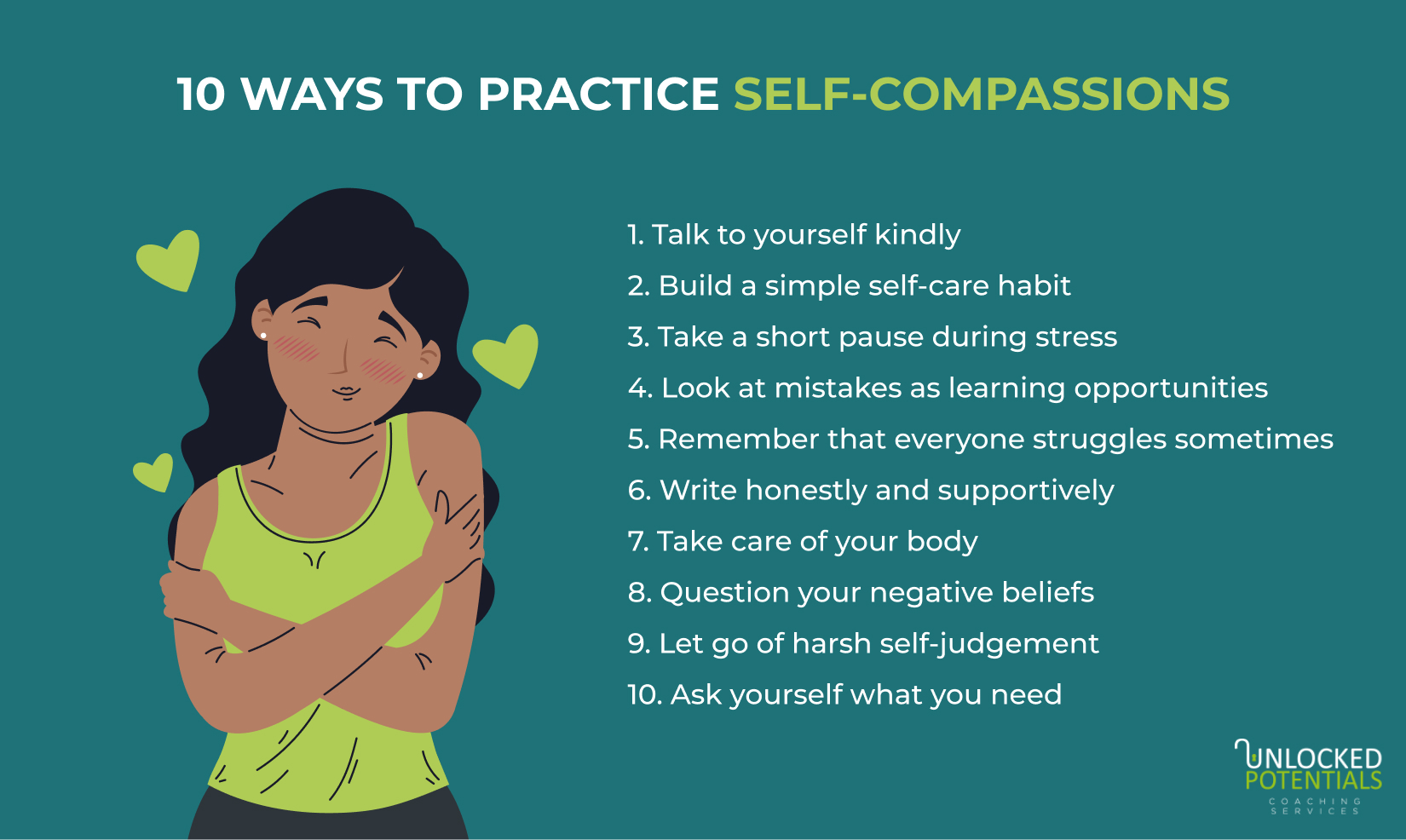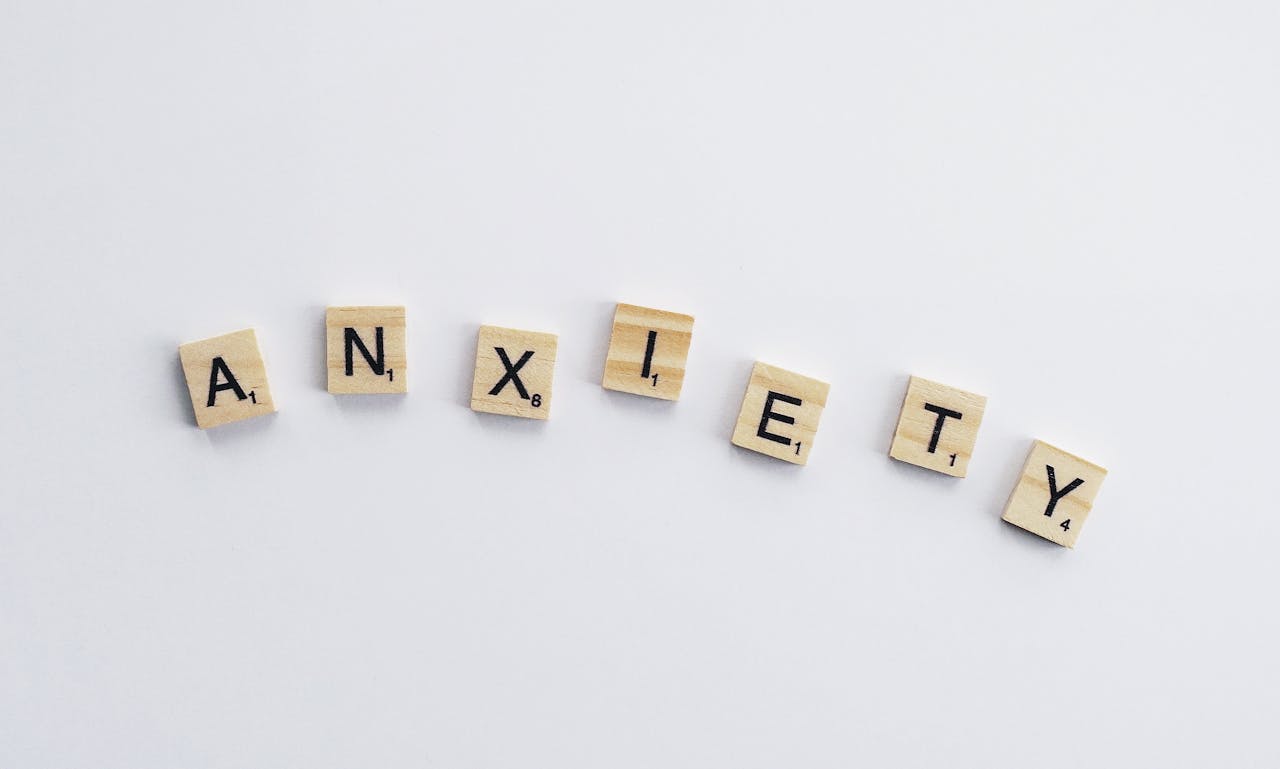What is Self-Compassion? 10 Tips and Techniques From a Life Coach

In a world that glorifies hustle, perfectionism, and constant achievement, it’s no surprise that many of us are far kinder to others than we are to ourselves. We cheer on our friends, offer compassion when they’re struggling, and extend forgiveness when they make mistakes. But when it comes to our own inner dialogue? It’s often critical, harsh, and unforgiving.
As a life coach, I’ve seen time and time again how transformative it is when people begin treating themselves with care, rather than criticism. In this article, I’ll walk you through exactly what self-compassion is and share ten practical, life-tested techniques to help you bring more of it into your daily life.
What Is Self-Compassion?
Self-compassion means being kind to yourself, especially when life feels hard. It’s about speaking to yourself with care, like you would speak to a close friend who’s struggling. Instead of judging yourself for every mistake, self-compassion helps you pause, breathe, and remind yourself that it’s okay to be human.
Dr Kristin Neff, one of the leading researchers on self-compassion, describes it through three simple ideas:
- Self-kindness vs self-judgement
When you mess up or fall short, do you call yourself names or feel like a failure? Self-compassion teaches us to replace that harsh voice with kindness. You can still learn from your mistakes, but without beating yourself up along the way. - Common humanity vs isolation
Everyone struggles sometimes. It’s easy to feel like you’re the only one who’s hurting or not coping. But the truth is, we all face challenges. Self-compassion reminds you that pain and setbacks are a normal part of life. - Mindfulness vs over-identification
This means noticing your thoughts and feelings without getting stuck in them. When you’re sad or frustrated, mindfulness helps you say, “This is hard right now,” instead of thinking, “I’m a mess” or “I can’t handle this.”
It’s also helpful to know what self-compassion isn’t. It’s not the same as self-esteem, which is often based on how well you’re doing or how others see you. And it’s not self-confidence, which is about what you believe you can achieve. Self-compassion is deeper, it stays with you whether you’re winning or struggling.
And no, it’s not selfish or lazy. Being kind to yourself doesn’t mean giving up or making excuses. In fact, it gives you the strength to keep going, with less shame and more hope.
Why Self-Compassion Matters
When life feels overwhelming, many of us believe we just need to try harder, be stronger, or stop “being too emotional.” But that inner pressure often leads to more stress and self-doubt. The truth is, harsh self-talk doesn’t make us better, it makes us burn out.
Self-compassion helps break that cycle. When you treat yourself with care during tough times, you’re more likely to bounce back, stay calm, and keep going. Research shows that self-compassion lowers stress, improves mental health, and even boosts motivation. People who practise it are less likely to struggle with anxiety and depression, not because they never fail, but because they respond to failure with kindness instead of criticism.
Think of self-compassion as a solid foundation. It doesn’t erase life’s challenges, but it gives you a softer, stronger place to land. When you’re kind to yourself, you’re giving yourself the emotional support you need to grow, heal, and move forward.
10 Practical Tips and Techniques From a Life Coach
Self-compassion is something you can practise. Like any new habit, it takes a bit of patience, but small steps make a real difference. Here are ten practical techniques I share with my clients to help them build a more supportive and nurturing relationship with themselves.
1. Speak to Yourself Like a Friend
Think about how you would comfort a close friend going through a tough time. Would you tell them they were useless or that they should’ve known better? Likely not. You’d offer kindness, reassurance, and encouragement.
Now ask yourself: Why should I speak to myself any differently?
This shift in tone can be powerful. The next time you catch yourself thinking, “I’ve messed everything up” or “I’m not good enough”, pause and reframe it. What would you say to a friend at that moment? Try saying it to yourself, out loud if you can. It might feel awkward at first, but the more you practise, the more natural it becomes.
Compassionate self-talk is not about pretending everything is perfect. It’s about offering yourself the grace to be human.
2. Create a Self-Compassion Ritual
Life moves quickly, and it’s easy to overlook your emotional needs in the daily rush. Creating a simple self-compassion ritual, something small but consistent, can anchor you.
- A few minutes of journaling each morning.
- Placing your hand on your heart and taking three deep breaths during stressful moments.
- A reminder on your phone that simply says, “You’re doing your best.”
Think of it as emotional hygiene. Just like brushing your teeth, tending to your inner world daily helps you stay mentally and emotionally well. Your ritual just needs to be something that brings you back to yourself with kindness.
3. Practice the Self-Compassion Break
This is one of my favourite tools from Dr Kristin Neff’s work, and I often teach it in coaching sessions. It’s a short, grounding exercise that you can use anytime you’re feeling overwhelmed, embarrassed, or upset.
Here’s how it works:
- Acknowledge the pain – “This is a moment of difficulty.”
- Remind yourself you’re not alone – “Struggles like this are part of being human.”
- Offer yourself kindness – “May I be gentle with myself right now.”
You can whisper it quietly or repeat it in your mind. This practice takes less than a minute, but it can interrupt the spiral of self-criticism and help you come back to the present with care.
4. Reframe Mistakes With Curiosity
We all make mistakes. But instead of using them as proof that you’ve failed, try using them as moments to learn.
When something doesn’t go as planned, ask yourself:
- “What can this teach me?”
- “What might I do differently next time?”
- “How can I grow from this without blaming myself?”
Curiosity softens judgement. It creates space for reflection without shame. Remember: you are allowed to be a work in progress. Growth isn’t about getting it perfect, it’s about showing up, learning, and trying again with more wisdom each time.
5. Recognise Common Humanity
One of the biggest lies our inner critic tells us is, “You’re the only one who feels this way.”
It’s simply not true.
Everyone has bad days. Everyone struggles with self-doubt. Everyone makes choices they wish they hadn’t. When you remind yourself that suffering is part of the shared human experience, it brings perspective, and often, relief.
If you’re going through a hard time, you are not broken. You are simply human. And that humanity connects you to others, rather than isolating you. In moments of pain, gently say to yourself: “Others feel this too. I’m not alone.”
That small reminder can shift how you carry your struggles with more softness.
6. Use Self-Compassionate Journaling
Writing things down can help untangle your thoughts and make sense of your emotions. But instead of simply venting frustrations or listing everything that went wrong, try journalling in a way that brings care and understanding to yourself.
Here’s a simple way to start:
- Describe what happened, honestly and gently.
- Acknowledge how you feel, without judgement (e.g., “I feel embarrassed”, or “I’m disappointed”).
- Respond with kindness, as though writing a letter to someone you love.
For example: “It’s okay that I didn’t get everything done today. I had a lot on my plate. I’m learning how to manage my time better, and I’m still doing my best.”
This kind of writing creates emotional space. It helps you process what you’re feeling while building a habit of treating yourself with more patience and care.
7. Comfort Your Body With Small Acts of Care
Self-compassion isn’t only about what we say to ourselves, it’s also about how we treat our bodies.
Simple, physical acts of care can help shift your nervous system out of stress and into safety. These might include:
- Taking a warm shower to soothe tension.
- Making a nourishing meal.
- Going for a walk in nature.
- Gently place your hand on your chest when you’re upset.
When you care for your body, you’re sending the message: “You matter. Your needs are important.” This physical reassurance supports your emotional wellbeing and reminds you that comfort is allowed, not something you have to earn.
8. Challenge Your Self-Compassion Myths
Many people resist self-compassion because of old beliefs that it’s somehow weak, selfish, or a way to avoid responsibility. But none of that is true.
Let’s challenge some of the common myths:
- “It’s selfish.” In fact, people who practise self-compassion are more likely to be kind and generous to others, because they’re not drained from self-judgement.
- “It will make me lazy.” Self-compassion doesn’t lower your standards — it simply changes your motivation. You still want to improve, but from a place of care, not fear.
- “It means letting myself off the hook.” Self-compassion includes accountability, but without shame. You can acknowledge a mistake and take responsibility without attacking your worth.
When you let go of these myths, you free yourself to grow in healthier, more sustainable ways.
9. Forgive Yourself Gently
We all carry things we wish we’d done differently; words we regret, moments we wish we could erase. But holding onto guilt or shame doesn’t help us heal. Forgiveness does.
Compassionate self-forgiveness isn’t about pretending nothing happened. It’s about releasing the constant replay of blame and allowing yourself to move forward.
Try this simple phrase:
“I forgive myself for judging myself as [fill in the blank]. The truth is, I was doing the best I could at the time.”
This helps shift the focus from harsh judgement to understanding. You can still learn from your actions, but from a place of care rather than punishment. With practice, this becomes a powerful tool for healing and personal growth.
10. Tune Into Your Needs
When things feel difficult, one of the kindest questions you can ask yourself is:
“What do I need right now?”
This might sound simple, but most of us aren’t used to checking in. We often override our needs in the name of busyness, people-pleasing, or productivity.
Next time you’re feeling anxious, tired, or overwhelmed, pause and ask:
- Do I need rest?
- Do I need a connection?
- Do I need to say ‘no’ to something?
- Do I need to step outside and breathe?
Listening to your needs and honouring them builds self-trust. Over time, you start to feel more emotionally supported from within, which is one of the greatest gifts self-compassion can offer.
Conclusion: Building a Kinder Inner World
Self-compassion isn’t something we’re always taught growing up, but it’s something we can learn and deepen over time. And when we do, everything begins to shift. We begin to meet ourselves with the same warmth and care we so often offer to others.
This journey is learning to befriend ourselves in all our messy, brilliant, beautifully human moments. Whether it’s through a kind word, a gentle breath, or a pause to ask, “What do I need right now?”, each small act of compassion builds a more loving inner world.
As a life coach, I’ve seen just how powerful this work can be. You don’t need to wait for the “right time” to begin, the right time is now, with whatever you have, exactly as you are. Start small. Be gentle. And trust that self-compassion isn’t a detour on your personal growth journey, it is the path.
You are worthy of your own kindness. Always.
Frequently Asked Questions
Is self-compassion the same as being easy on myself?
Not quite. Being self-compassionate doesn’t mean you avoid responsibility or ignore problems. It simply means you’re honest about your challenges while treating yourself with care, rather than harsh judgement. You still learn from mistakes, but without punishing yourself in the process.
How can I practise self-compassion in a busy lifestyle?
Start small. You don’t need an hour of meditation or a weekend retreat. Self-compassion can be a two-minute pause in the car before work, taking a breath after a stressful meeting, or choosing rest when you’re tired.
Will self-compassion lower my motivation to succeed?
No, it actually helps you stay motivated for longer. People often confuse self-compassion with being soft or unmotivated, but research shows it encourages long-term growth. When you support yourself through setbacks instead of criticising, you’re more likely to try again with less stress and more clarity.
What if self-compassion feels unnatural or uncomfortable?
That’s completely normal, especially if you weren’t taught to be kind to yourself growing up. Like any new habit, it takes time to feel natural. At first, it may feel awkward to speak gently to yourself or pause when you’re struggling, but with practice, it becomes easier and more familiar.
Can self-compassion help with anxiety or burnout?
Yes. Practising self-compassion can reduce emotional strain and support mental wellbeing. When you’re less harsh with yourself, you give your body and mind space to recover. This is especially helpful in environments with high pressure, such as demanding jobs, family responsibilities, or social expectations common in the UAE.
- October 2025
- September 2025
- August 2025
- July 2025
- June 2025
- May 2025
- April 2025
- March 2025
- February 2025
- January 2025
- December 2024
- November 2024
- October 2024
- September 2024
- August 2024
- July 2024
- June 2024
- May 2024
- December 2023
- November 2023
- August 2023
- July 2023
- June 2023
- May 2023
- April 2023
- March 2023
- February 2023
- January 2023
- December 2022
- November 2022
- October 2022
- September 2022
- August 2022
- July 2022
- June 2022
- May 2022
- April 2022
- March 2022
- February 2022
- January 2022
- December 2021
- November 2021
- October 2021
- September 2021
- August 2021
- July 2021
- June 2021
- May 2021
- April 2021
- March 2020
- February 2020
- January 2020
- December 2019
- November 2019
- October 2019
- September 2019
- August 2019
- July 2019
- June 2019
- May 2019
- April 2019
- March 2019
- February 2019
- January 2019
- December 2018
- November 2018
- October 2018
- September 2018
- August 2018
- July 2015
- May 2014






